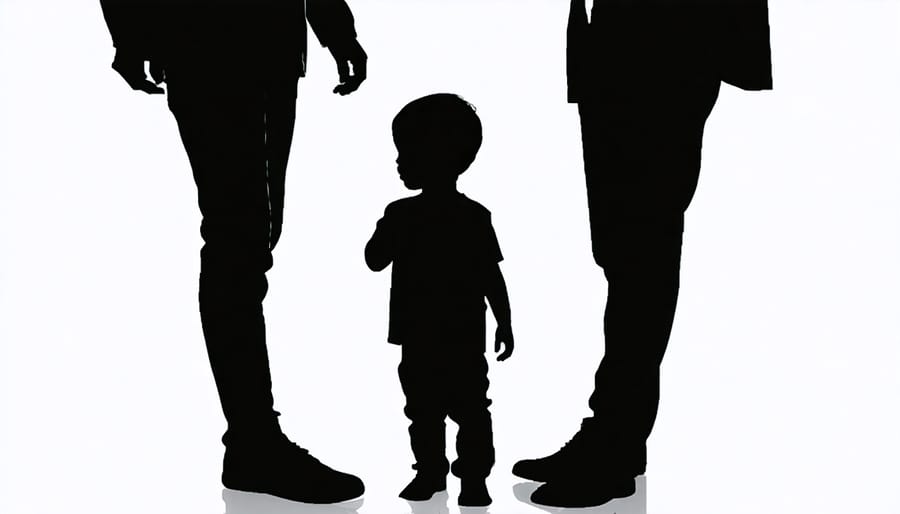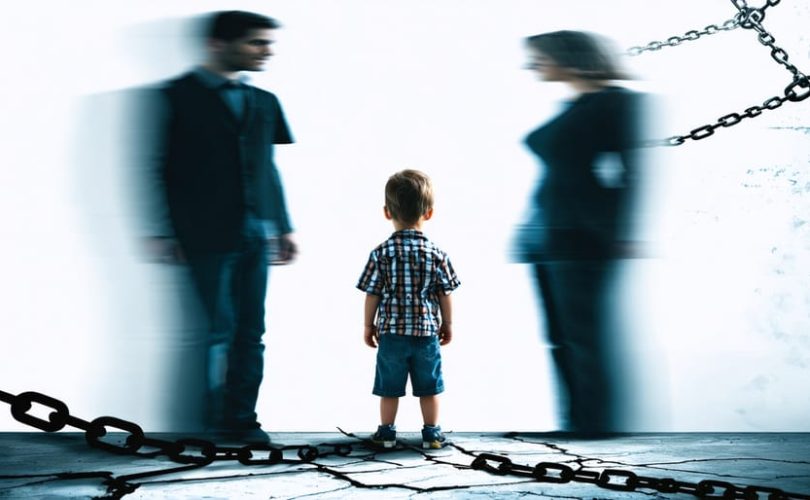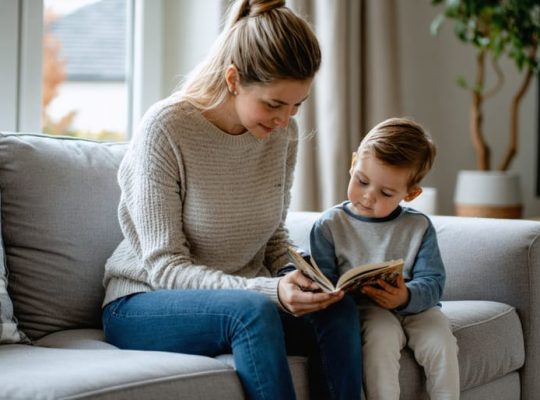Parental alienation silently devastates families, leaving deep emotional wounds that can span generations. When one parent systematically undermines a child’s relationship with the other parent, the psychological damage extends far beyond the immediate family dynamic. As parents’ self-esteem and emotional well-being deteriorate, children become unwitting victims in a complex web of manipulation and emotional abuse.
This form of psychological manipulation doesn’t just strain parent-child bonds—it fundamentally reshapes a child’s understanding of love, trust, and healthy relationships. Mental health professionals increasingly recognize parental alienation as a serious form of emotional abuse, with consequences that can persist well into adulthood. Understanding these effects is crucial for parents, caregivers, and professionals working to protect children’s emotional well-being.
In this article, we’ll explore six of the most devastating effects of parental alienation, backed by current research and expert insights. Whether you’re experiencing this situation firsthand or supporting someone who is, recognizing these impacts is the first step toward healing and protecting vulnerable children from lasting psychological harm.
Understanding the Cycle of Parental Alienation
Parental alienation typically develops gradually, following a pattern that can be devastating for both the targeted parent and the child. It often begins subtly, with one parent making occasional negative remarks about the other parent, which slowly escalates into a systematic campaign of denigration.
The cycle usually starts during or after a high-conflict separation or divorce. The alienating parent might begin by sharing inappropriate information about the separation with the child or making the child feel guilty for spending time with or showing affection toward the other parent. This behavior can manifest through subtle actions like eye-rolling when the other parent is mentioned or more overt tactics like interfering with communication and visitation.
As time progresses, children may begin internalizing these negative messages and developing their own reasons for rejecting the targeted parent. They might start refusing visits, showing hostility, or making false allegations against the targeted parent. This behavior is often reinforced by the alienating parent’s approval, creating a self-perpetuating cycle.
Mental health professionals have observed that this cycle typically intensifies during significant life events such as holidays, birthdays, or school events. The alienating parent might use these occasions to create conflicts or manipulate situations to further damage the child’s relationship with the targeted parent.
Breaking this cycle requires early recognition and intervention. When left unchecked, the pattern becomes more entrenched, making it increasingly difficult to repair the damaged relationship. Understanding these patterns is crucial for parents, family court professionals, and mental health practitioners working to protect children from the harmful effects of parental alienation.

The Emotional Toll on Children

Shattered Trust and Attachment Issues
One of the most profound impacts of parental alienation is its devastating effect on a child’s ability to form and maintain healthy attachments. When children experience systematic alienation from a parent, their fundamental understanding of trust and relationships becomes severely compromised.
Dr. Sarah Miller, a child psychologist specializing in trauma, explains, “Children naturally develop their understanding of relationships through their early bonds with parents. When one parent actively undermines the relationship with the other, it creates deep-seated confusion and anxiety about who they can truly trust.”
This disruption often manifests in various ways. Children may develop an intense fear of abandonment, believing that if one parent could be “bad,” others might leave them too. They might struggle with forming close friendships or maintaining romantic relationships later in life, always waiting for the other shoe to drop.
Consider Emma’s story: “Growing up, I was constantly told my father didn’t really love me. Now, at 28, I find myself pushing away anyone who tries to get close. I’m always looking for signs that people will eventually betray me, just like I was taught my father did.”
The impact extends beyond personal relationships. These children often develop a distorted view of reality and struggle with self-trust. They may question their own judgments and memories, leading to decreased self-confidence and difficulty making decisions.
Recovery is possible, but it requires understanding and patience. Building a secure attachment pattern later in life involves consistent, trustworthy relationships and often benefits from professional support to process and heal from the original trauma.
Identity Crisis and Self-Worth Struggles
One of the most profound impacts of parental alienation is its effect on a child’s sense of identity and self-worth. Children naturally develop their self-image through their relationships with both parents, and when one parent is systematically removed from their life, it creates a devastating void in their emotional development.
Children caught in parental alienation often struggle with conflicting feelings about who they are. They might question whether they’re worthy of love, especially when they’re forced to reject one parent to maintain a relationship with the other. This internal conflict can lead to deep-seated confusion about their own identity and value.
Many children in these situations develop what mental health professionals call “split loyalty” – feeling torn between two parts of themselves. They might suppress positive memories or feelings about the alienated parent to cope with the situation, which can result in a fragmented sense of self.
Sarah, a family therapist with 15 years of experience working with alienated children, shares: “These children often feel like they have to be two different people. They learn to hide parts of themselves to survive emotionally, which can lead to serious identity issues later in life.”
The impact on self-worth can be particularly devastating. Children may internalize the conflict and blame themselves for the family breakdown. They might think, “If I were a better child, this wouldn’t be happening,” or “Maybe I don’t deserve to have both parents in my life.” These harmful beliefs can persist well into adulthood if not addressed through proper support and intervention.
Anxiety and Depression Development
Children experiencing parental alienation often develop significant mental health challenges, particularly anxiety and depression. When a child is caught in the crossfire of parental conflict and manipulation, their emotional well-being can be severely compromised. Research shows that these children frequently exhibit disturbing anxiety patterns that can persist well into adulthood.
Dr. Sarah Thompson, a child psychologist specializing in family trauma, notes: “These children often struggle with persistent feelings of worthlessness, confusion, and deep sadness. They’re essentially forced to reject a part of themselves when rejecting a parent, leading to internal conflict and emotional instability.”
The anxiety manifests in various ways, including difficulty sleeping, constant worry about disappointing either parent, and fear of abandonment. Depression might show up as withdrawal from activities they once enjoyed, changes in eating habits, or declining academic performance. Many affected children report feeling “stuck” between their parents, leading to chronic stress and emotional exhaustion.
What makes this particularly concerning is how these mental health issues can become deeply ingrained, affecting future relationships and self-worth. The good news is that with proper support and intervention, children can learn to process these complex emotions and develop healthier coping mechanisms. Early recognition and professional help are crucial in preventing long-term psychological damage.
Long-Term Relationship Consequences
Difficulty Forming Healthy Relationships
One of the most profound impacts of parental alienation is its effect on a child’s ability to form and maintain healthy relationships later in life. Children who experience parental alienation often develop deep-seated trust issues and emotional barriers that can persist well into adulthood.
Dr. Sarah Thompson, a family therapist with 15 years of experience working with alienated children, explains, “These children learn early on that relationships can be manipulated and love can be conditional. This creates a framework of fear and suspicion in their approach to future relationships.”
Many adults who experienced parental alienation as children report difficulties in maintaining intimate relationships. They may struggle with fear of abandonment, excessive need for control, or difficulty with emotional vulnerability. Some swing between being overly dependent and fiercely independent in their relationships, unable to find a healthy middle ground.
Friendships can also be affected, as these individuals often find it challenging to trust others’ intentions or maintain long-term connections. They might test relationships repeatedly or withdraw at the first sign of conflict, recreating patterns learned during the alienation experience.
However, recovery is possible. Through therapy and self-awareness, many survivors of parental alienation learn to recognize these patterns and develop healthier relationship skills. Understanding that these difficulties stem from past experiences, not personal failings, is often the first step toward healing.
Generational Pattern Risks
One of the most concerning aspects of parental alienation is its tendency to echo through generations. Children who experience alienation often unknowingly carry these learned behaviors into their own parenting journey, creating a cycle that can affect multiple generations of families.
Dr. Sarah Thompson, a family therapist with 20 years of experience, explains, “Children learn relationship patterns from their parents. When they witness and experience alienation, they may internalize these behaviors as normal, despite their harmful nature.”
This generational impact manifests in various ways. Adult survivors of parental alienation might struggle with trust issues in their own relationships, potentially becoming overprotective or distant parents themselves. Some may unconsciously mirror the alienating behaviors they experienced, while others might swing to the opposite extreme, becoming overly permissive to avoid any resemblance to their alienating parent.
Breaking this cycle requires awareness and conscious effort. Many parents who recognize these patterns in themselves seek professional help to develop healthier parenting strategies. Support groups and family therapy can provide valuable tools for understanding and addressing these inherited behaviors.
“The good news,” shares Thompson, “is that with proper support and intervention, parents can learn to recognize these patterns and make different choices, creating a healthier emotional environment for their children and future generations.”

Breaking the Cycle
Breaking the cycle of parental alienation requires commitment, patience, and often professional support. The first step is acknowledging the problem and seeking help from qualified mental health professionals who specialize in family dynamics. Family therapy can provide a safe space for both parents and children to express their feelings and work toward healing.
For targeted parents, maintaining consistent, positive communication with your child is crucial, even when faced with rejection. Focus on creating a warm, welcoming environment during visits, and avoid speaking negatively about the other parent, regardless of circumstances. Remember that breaking destructive parenting cycles starts with conscious choices and emotional awareness.
For alienating parents, recognizing the impact of your actions on your child’s well-being is essential. Working with a therapist can help address underlying issues that may be driving alienating behaviors. Learning to separate adult conflicts from your child’s relationship with their other parent is crucial for their emotional health.
Some practical strategies include:
– Maintaining detailed records of communication and interactions
– Following court-ordered visitation schedules consistently
– Using parallel parenting techniques when direct co-parenting is challenging
– Engaging in individual therapy to process personal emotions
– Participating in parent education programs
– Building a support network of professionals and understanding friends
Remember, recovery from parental alienation is possible with the right support and dedication to change. The goal is to create a healthy environment where children can maintain loving relationships with both parents without feeling caught in the middle.
Parental alienation leaves deep emotional scars, but understanding its devastating effects is the first step toward healing and recovery. As we’ve explored, the impacts range from severe emotional trauma and damaged self-esteem to long-term relationship difficulties and mental health challenges. Children caught in these situations often carry these wounds into adulthood, affecting their ability to form healthy relationships and maintain emotional well-being.
However, there is hope. With proper support, therapy, and intervention, both children and parents can begin to heal from these experiences. Many families have successfully rebuilt their relationships through dedicated counseling, open communication, and a commitment to understanding and addressing the root causes of alienation.
If you recognize these patterns in your family situation, remember that seeking help is not a sign of weakness but a step toward healing. Mental health professionals specializing in family dynamics can provide valuable tools and strategies for rebuilding damaged relationships. Support groups also offer safe spaces where affected parents and children can share experiences and find comfort in knowing they’re not alone.
The journey to recovery may be challenging, but with patience, understanding, and professional guidance, families can work toward restoration and healing. Remember, it’s never too late to begin the process of rebuilding trust and reconnecting with your loved ones.
Together, we can break the cycle of parental alienation and create healthier family dynamics for future generations.




